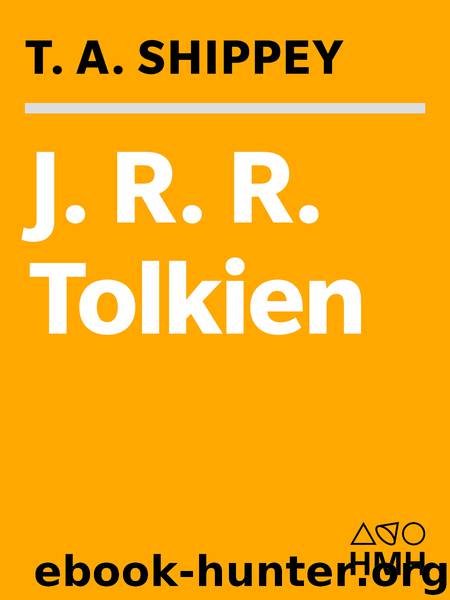J.R.R. Tolkien by Tom Shippey

Author:Tom Shippey [T.A. Shippey ]
Language: eng
Format: epub
Publisher: Houghton Mifflin Harcourt
CHAPTER IV
THE LORD OF THE RINGS
(3): THE MYTHIC DIMENSION
Allegory and applicability
In the ‘Foreword’ to the second edition of The Lord of the Rings, Tolkien wrote: ‘I cordially dislike allegory in all its manifestations, and always have done since I grew old and wary enough to detect its presence’. As with the denial of any link between rabbits and hobbits (see chapter I), the evidence is rather against Tolkien here. He was perfectly capable of using allegory himself, and did so several times in his academic works, usually with devastating effect. In his 1936 lecture on Beowulf, for instance, Tolkien offered his British Academy audience ‘yet another allegory’ (it was not the first in the lecture), about a man who built a tower. He took the stone for the tower from a ruin, ‘an accumulation of old stone’ in a field, part of which had also been used to build the house in which the man actually lived, ‘not far from the old house of his fathers’ (i.e. the ruin). But his friends came along, noticed at once that the tower was made of older stones, and laboriously knocked the tower down to examine the stones, look for carvings on them, prospect for coal, and so on. Then some of them complained that the tower was in a terrible mess, while even the man’s descendants murmured that he should have spent his time not building the tower but restoring the ruin. ‘But from the top of that tower the man had been able to look out upon the sea’ (see Essays, pp. 7-8).
There is no doubt that this is an allegory, for Tolkien says so himself. A brief study of it, concentrating on the elements italicized above, may explain exactly what Tolkien meant by the word, how he expected allegories to work, and why he disliked both word and thing when they were misused. Tolkien’s little story is an allegory of the progress of Beowulf criticism, one of the major features of which, up to Tolkien’s time, had been a conviction that the poet had written the wrong poem. Its accuracy, or ‘justness’ to use Tolkien’s own term, is hard to appreciate without the kind of awareness of Beowulf scholarship which Tolkien’s original audience may be supposed to have had, but in brief one could say that:
The old stone, i.e. the ruin = the remains of an earlier, heathen, oral poetry which the Beowulf-poet might have known about
The house the man lives in, also partly built from the ruin = Christian poetry contemporary with Beowulf like the poem Exodus (Tolkien’s edition of which was published posthumously in 1981), which also drew on the early oral poetry
The tower, of course = Beowulf, and the man = the Beowulf-poet
The man’s friends who knock his tower down = the dissectionist critics of the nineteenth century, who concentrated their efforts on pointing out where the poem had gone wrong
Finally, the man’s descendants, who wished he had restored the old house = British critics like W.P. Ker and R.
Download
This site does not store any files on its server. We only index and link to content provided by other sites. Please contact the content providers to delete copyright contents if any and email us, we'll remove relevant links or contents immediately.
| Books & Reading | Comparative Literature |
| Criticism & Theory | Genres & Styles |
| Movements & Periods | Reference |
| Regional & Cultural | Women Authors |
4 3 2 1: A Novel by Paul Auster(12354)
The handmaid's tale by Margaret Atwood(7727)
Giovanni's Room by James Baldwin(7301)
Asking the Right Questions: A Guide to Critical Thinking by M. Neil Browne & Stuart M. Keeley(5740)
Big Magic: Creative Living Beyond Fear by Elizabeth Gilbert(5725)
Ego Is the Enemy by Ryan Holiday(5391)
The Body: A Guide for Occupants by Bill Bryson(5065)
On Writing A Memoir of the Craft by Stephen King(4912)
Ken Follett - World without end by Ken Follett(4705)
Adulting by Kelly Williams Brown(4552)
Bluets by Maggie Nelson(4534)
Eat That Frog! by Brian Tracy(4499)
Guilty Pleasures by Laurell K Hamilton(4422)
The Poetry of Pablo Neruda by Pablo Neruda(4079)
Alive: The Story of the Andes Survivors by Piers Paul Read(4009)
White Noise - A Novel by Don DeLillo(3989)
Fingerprints of the Gods by Graham Hancock(3979)
The Book of Joy by Dalai Lama(3959)
The Bookshop by Penelope Fitzgerald(3827)
